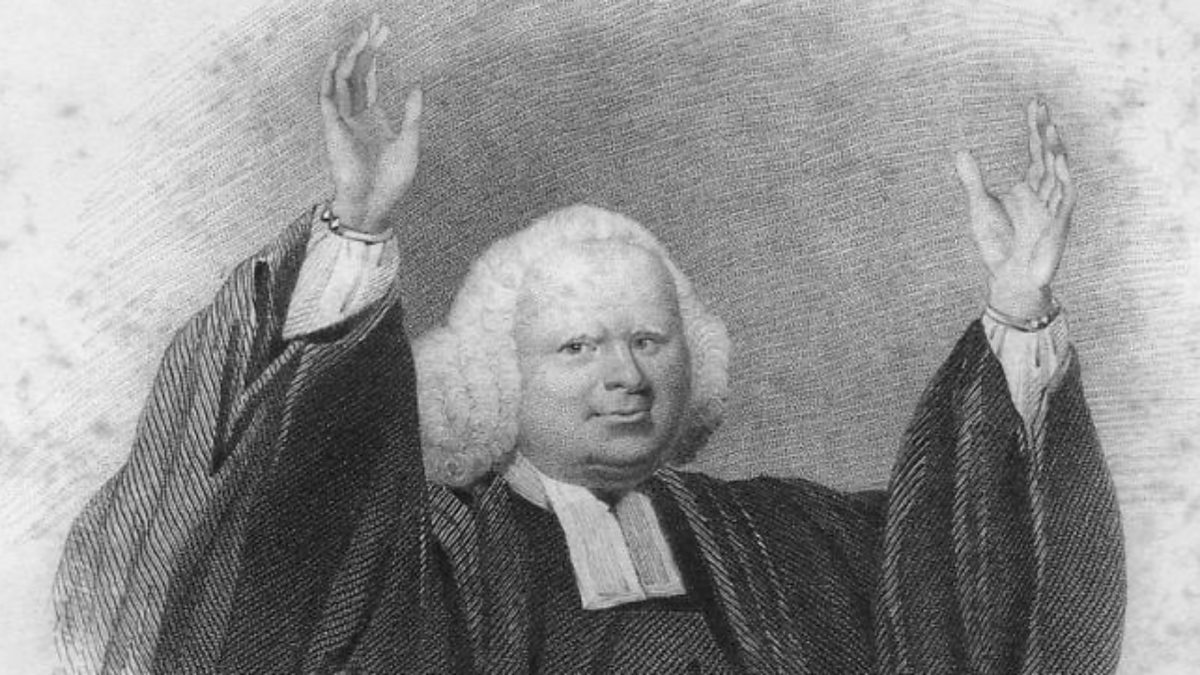George Whitefield 1714-1770
George Whitefield on Salvation and Communion with God
By Mark J. Larson
Reprinted from The Banner of Truth Magazine #710, November 2022
It was the New England tour of the evangelist George Whitefield. He had proclaimed the gospel on the Boston Common to 23,000 people, the largest crowd that had ever gathered in America. It was now October of 1740, and Whitefield was riding horseback to Northampton, Massachusetts, having been invited to preach by the Reverend Jonathan Edwards. Two sermons on Friday, one on Saturday, and two more on Sunday followed, the 17th through the 19th.
Sarah Edwards reflected on what happened, ‘It is wonderful to see what a spell he casts over an audience by proclaiming the simplest truths of the Bible. I have seen upward of a thousand people hang on his words with breathless silence.’ ‘Many, very many persons in Northampton date the beginning of new thoughts, new desires, new purposes, and a new life, from the day they heard him preach of Christ.’ Jonathan Edwards was deeply moved. Whitefield wrote, ‘Good Mr Edwards wept during the whole time.’
How shall we explain the remarkable power of Whitefield’s ministry? His holy life was the fundamental thing. Nathan Cole, a Connecticut farmer, testified, ‘When I saw Mr Whit[e]field come upon the Scaffold he Lookt almost angelical.’ ‘He looked as if he was Cloathed with authority from the Great God; and a sweet sollome [solemn] solemnity sat upon his brow.’ John Wesley spoke in a similar way, ‘How few have we known of so kind a temper, of such large and flowing affections! Was it not principally by this, that the hearts of others were so strangely drawn and knit to him?’
His incredible impact was also due to the simple fact that Whitefield preached the truth about salvation, thus bringing the outpouring of the divine Spirit. What exactly did he teach? Salvation, he maintained, has two aspects, the legal (justification) and the transformative (regeneration and sanctification). His message stood in continuity with the doctrine set forth by Jonathan Edwards who was also used by God in the salvation of many souls.
Justification by faith alone
Whitefield warned that we must not base our ‘hopes of heaven’ upon baptism or church membership, calling it ‘a sorry rotten foundation’ upon which to base one’s hope of salvation (‘Marks of a True Conversion’). In his last sermon preached in the open field at Exeter, New Hampshire, Whitefield cried out, ‘Works! Works! a man get to heaven by works! I would as soon think of climbing to the moon on a rope of sand’ (Stout, The Divine Dramatist).
We must place our complete trust in the Lord. Whitefield declared, ‘When we are justified by faith in Christ, then, but not till then, we have peace with God’ (‘Walking with God’). We must receive the ‘blotting out of all our transgressions’ and the righteousness of another—‘By the obedience of one, Jesus Christ (therein including his passive as well as active obedience), many were made righteous’ (‘Of Justification by Christ’).
Edwards, likewise, embraced the Christ alone principle of the Reformation. In his reflections on justification in his Miscellanies, Edwards wrote, ‘God don’t justify us in this manner, upon the account of any act of ours, whether it be the act of faith or any other act whatsoever, but only on account of what the Savior did.’ Our justification rests upon ‘the merit of what he did and suffered.’ Faith alone is the instrument of our justification: ‘Thus it is that we are said to be justified by faith alone: that is: we are justified only because our souls close and join with Christ the Savior.’
Salvation as inward renewal
Our desperate need to be born again is based upon the inborn condition of our heart. Whitefield insisted that the ‘prevailing power’ of ‘enmity’ is found within us: ‘Enmity rules and prevails in every man that is naturally engendered of the offspring of Adam.’ ‘All that open sin and wickedness, which like a deluge has overflowed the world, are only so many streams running from this dreadful contagious foundation; I mean enmity of man’s desperately wicked and deceitful heart’ (‘Walking with God’).
Edwards was no less adamant on our native state. ‘Our souls,’ he said, ‘have become as vile as the dirt of the earth.’ ‘Our hearts’ are ‘altogether dead, senseless of spiritual things, wholly unfit for spiritual and vital acts, wholly dark, wholly without any form or comeliness’ (‘On the Parable of the Sower and the Seed’).
The wonder of the gospel is that divine power is unleashed so that we are changed within. The change that passes upon our souls, contended Whitefield, is ‘great,’ ‘notable, and amazing.’ There is an ‘alteration’ worked within us. ‘Our temper, habit, and conduct’ is ‘changed and altered.’ ‘Whatever were our former high-exalted imaginations, yet we shall now be sensible of our weakness; we shall no more say, “We are rich and increased with goods and lack nothing”; we shall be inwardly poor; we shall feel “that we are poor, miserable, blind, and naked.”’ ‘We shall be harmless,’ ‘having an honest heart.’ ‘If we are really converted, we shall be loose to the world’ (‘Marks of a True Conversion’).
Edwards described the new birth in similar terms. When God enlightens the heart, it ‘changes the nature of the soul. It assimilates the nature to the divine nature, and changes the soul into an image of the same glory that is beheld’ (‘A Divine and Supernatural Light’). ‘When the Spirit of God enters the soul, love enters.’ ‘The nature of the Holy Spirit is love; and it is by communicating himself, or his own nature, that the hearts of the saints are filled with love.’ He elaborated, ‘It is altogether a sweet disposition and affection of the soul. Love will prevent broils and quarrels, and will dispose to peaceableness’ (‘Charity and Its Fruits’).
When saving grace touched Edwards in his youth, he said, ‘I had vehement longings of soul after God and Christ, and after more holiness.’ He likewise, in the language of Whitefield, became ‘loose to the world’: ‘How happy I should be, if I might enjoy that God, and be wrapped up to God in heaven, and be as it were swallowed up in him’ (‘Personal Narrative’).
The wonder of fellowship with God
The legal and transformative blessings of salvation allow us to go through this life in the enjoyment of fellowship with the Father and the Son. Whitefield put it this way, ‘Walking with God not only implies that the prevailing power of the enmity of a man’s heart be taken away, but also that a person is actually reconciled to God the Father, in and through the all-sufficient righteousness and atonement of his dear Son’ (‘Walking with God’).
How do we experience the presence of God in our lives? To use the language of Calvin, how is it that ‘God gives himself to us’? And how do we ‘possess him, and have full enjoyment of him’ (Institutes of the Christian Religion III.3.24)?
Whitefield drew attention to the reading of the Bible and prayer. ‘Believers,’ he said, ‘keep up and maintain their walk with God by reading of his holy Word.’ The day will come when ‘we shake off these bodies and see Jesus face to face. Till then we must see and converse with him through the glass of his Word.’ What does prayer do? ‘Prayer! It brings and keeps God and man together. It raises man up to God, and brings God down to man’ (‘Walking with God’).
Edwards spoke in a similar way about his communion with the Lord. ‘My mind,’ he wrote, ‘was greatly enlarged, to spend my time in reading and meditating on Christ; and the beauty and excellency of his person, and the lovely way of salvation, by free grace in him.’ Edwards referred to the sense that he had of being alone, ‘sweetly conversing with Christ’ (‘Personal Narrative’).
This is what Edwards found so attractive about Sarah Pierpont, the young woman who would become his wife. He described her as ‘a young lady’ who ‘is beloved of that almighty Being, who made and rules the world.’ She is one, he said, who had ‘a wonderful sweetness, calmness and universal benevolence of mind; especially after those seasons in which this great God has manifested himself to her mind. She will sometimes go from place to place, singing sweetly, and seems to be always full of joy and pleasure’ (‘Apostrophe to Sarah Pierpont’).
What real happiness is
The believer answers with a yes to Whitefield’s questions. ‘Has not one day in the Lord’s courts been better than a thousand?’ ‘Has not his Word been sweeter to you than the honey or the honeycomb?’ ‘Has not the Holy Ghost frequently shed the divine love abroad in your hearts abundantly and filled you with joy unspeakable, even joy that is full of glory?’
This is not to say that the Christian life is free from suffering. Whitefield acknowledged that there are times when we are ‘afflicted, tempted, destitute, and tormented.’ But he reminded us to never forget that ‘there is a heaven at the end of this walk’ with God. ‘After death, the spirits of those who have walked with God shall return to God that gave them; and at the morning of the resurrection, soul and body shall be forever with the Lord.’
Where do you stand in your relationship with the Lord? Whitefield addressed those who ‘are yet strangers to Christ.’ May we take his words to heart: ‘If you love honor, pleasure, and a crown of glory, come, seek it where alone it can be found. Come, put on the Lord Jesus. Come, haste away and walk with God, and make no longer provision for the flesh, to fulfill the lust thereof ’ (‘Walking with God’).
RELATED:




![Complete In Prayer: Jack Hibbs on Spiritual Warfare [This completes the series]](https://acrookedpath.com/wp-content/uploads/2024/04/0-71-500x383.jpg)


Leave a Reply, please --- thank you.